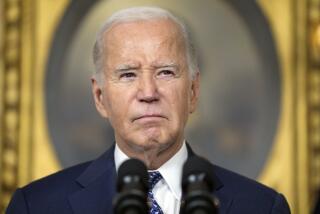Muddy Flap
The Senate Intelligence Committee’s much-rewritten report on its Iran arms- contra financing investigation necessarily falls well short of being the last or even the next-to-last word on the subject. At best, lacking the testimony of key National Security Council participants in the affair, the report can do little more than place on the table a number of pieces of a complex puzzle before leaning toward some interim and inevitably disputable conclusions about what they all might mean. Chief among those conclusions, in the estimate of the Republican staff members who produced the report, is that President Reagan was unaware that money from Iranian arms sales was being diverted to Nicaraguan contras.
The White House, no doubt eager to see this tentative assessment fixed in the public mind as final and conclusive, has demanded that the committee report be released. In the somewhat curious White House view, the President’s supposed ignorance about what his subordinates were up to translates as a political plus, leaving him blameless for the resulting mess. Senate Democrats, with some help from Republicans on the Intelligence Committee, have in effect said nuts to that and refused to allow release of the report, contending that it is too incomplete and inaccurate to be of much value. This, too, we find somewhat curious, for after three weeks of secret sessions during which 36 witnesses were heard a lot of information worth the public’s attention surely had to have been produced. Why couldn’t the committee have released the substance of that information, without trying to draw conclusions from it, instead of suppressing the whole of its report because of a political argument over what inferences should be made?
The flap over the report in any event will likely be short-lived. The committee investigation ought to be seen as necessarily having been in the nature of a preliminary reconnaissance, limited by the time left available to the expiring 99th Congress and by the degree of cooperation it was able to get from the people it questioned. Far more important will be the work done by the select committees chosen by the House and Senate and the independent investigation that will be conducted by a special counsel. As these efforts develop, the public will have ample opportunity to learn more about the scandal and to reach its own conclusions.
More to Read
Get the L.A. Times Politics newsletter
Deeply reported insights into legislation, politics and policy from Sacramento, Washington and beyond. In your inbox three times per week.
You may occasionally receive promotional content from the Los Angeles Times.










